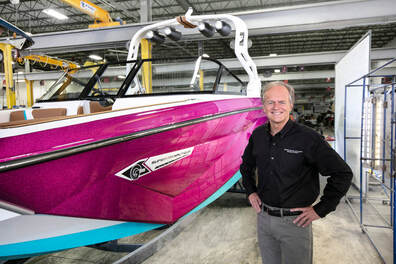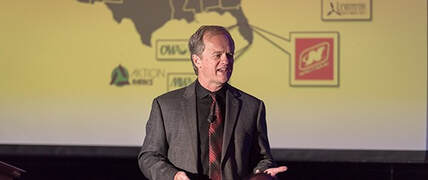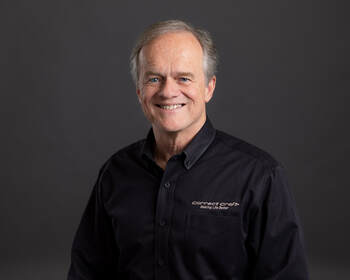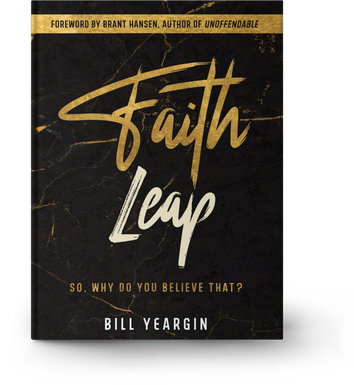Q&A with Bill Yeargin
CEO of Correct Craft and Author of "Faith Leap"
Q: What motivated you to write “Faith Leap”?
A: This book is an effort to share my story, hoping it will encourage those struggling with their faith, and help folks who may not be confident they can believe in Jesus. More importantly, and selfishly, it is a book that I hope will inspire future generations of my family to know they can believe in Jesus and remain solid in their faith. Throughout this book, I share what to me are layers of evidence that lay an intellectual foundation for belief in Jesus.
Q: Who will get the most from this book?
A: My strong desire is that this book will both encourage readers who are having doubts about their faith and inspire them to continue their faith search. If someone doesn’t identify as a Christian, I hope that reading about my journey will be a catalyst encouraging them to consider Christianity. If someone’s Christian faith is already solid, I hope this book will encourage them to make it even more important in your life. I am calling this a “lower shelf” apologetics book. It provides intellectual arguments, but there is a reason it is called “faith leap.” While plenty of evidence exists pointing to the validity of Christianity, faith in Jesus is still required to be a Christian. It requires moving away from a purely intellectual pursuit and trusting God.
Q: You consider yourself a "culture evangelist." What does that mean?
A: I strongly believe that if a leader is intentional about driving healthy culture at their organization it has a big positive impact. Correct Craft, the company where I serve as CEO, has a wonderful past and has historically been recognized as an organization with an enviable culture. But by the time I arrived at Correct Craft, the fighting within the company’s ownership family, combined with a revolving door of CEOs, had created a culture that was, I think it’s fair to say, toxic. Now, nearly 20 years later, Correct Craft has grown dramatically, exceeding our goal of over $1 billion in annual revenue. When people ask about the “secret sauce” that both turned Correct Craft around and fueled our tremendous growth, I share that it is primarily two things: our strategic planning process and our culture. I believe that it was a volunteer service trip to Tecate, Mexico shortly after I joined the company that became the turning point for our company. I took 25 employees with me to help a homeless family. We slept in the desert in 110-degree heat and used lake water to bathe — it was decidedly unglamorous. But it changed the lives of those employees who made the trip. Even those on our team who did not travel to Mexico heard the stories and saw that we had been able to help people who needed us— people who would never be able to pay us back. Our team now had something bigger than just boats to build and our organizational mess to clean up. We were determined to use our platform for good, and it pointed Correct Craft in a great new direction.
A: This book is an effort to share my story, hoping it will encourage those struggling with their faith, and help folks who may not be confident they can believe in Jesus. More importantly, and selfishly, it is a book that I hope will inspire future generations of my family to know they can believe in Jesus and remain solid in their faith. Throughout this book, I share what to me are layers of evidence that lay an intellectual foundation for belief in Jesus.
Q: Who will get the most from this book?
A: My strong desire is that this book will both encourage readers who are having doubts about their faith and inspire them to continue their faith search. If someone doesn’t identify as a Christian, I hope that reading about my journey will be a catalyst encouraging them to consider Christianity. If someone’s Christian faith is already solid, I hope this book will encourage them to make it even more important in your life. I am calling this a “lower shelf” apologetics book. It provides intellectual arguments, but there is a reason it is called “faith leap.” While plenty of evidence exists pointing to the validity of Christianity, faith in Jesus is still required to be a Christian. It requires moving away from a purely intellectual pursuit and trusting God.
Q: You consider yourself a "culture evangelist." What does that mean?
A: I strongly believe that if a leader is intentional about driving healthy culture at their organization it has a big positive impact. Correct Craft, the company where I serve as CEO, has a wonderful past and has historically been recognized as an organization with an enviable culture. But by the time I arrived at Correct Craft, the fighting within the company’s ownership family, combined with a revolving door of CEOs, had created a culture that was, I think it’s fair to say, toxic. Now, nearly 20 years later, Correct Craft has grown dramatically, exceeding our goal of over $1 billion in annual revenue. When people ask about the “secret sauce” that both turned Correct Craft around and fueled our tremendous growth, I share that it is primarily two things: our strategic planning process and our culture. I believe that it was a volunteer service trip to Tecate, Mexico shortly after I joined the company that became the turning point for our company. I took 25 employees with me to help a homeless family. We slept in the desert in 110-degree heat and used lake water to bathe — it was decidedly unglamorous. But it changed the lives of those employees who made the trip. Even those on our team who did not travel to Mexico heard the stories and saw that we had been able to help people who needed us— people who would never be able to pay us back. Our team now had something bigger than just boats to build and our organizational mess to clean up. We were determined to use our platform for good, and it pointed Correct Craft in a great new direction.
Q: As CEO of a large boat company, how do you share your faith with employees who may not share your convictions?
A: Our company has a long history of modeling the values of being a Christian, and we provide opportunities to employees to embrace their faith, but there is zero pressure put on anyone. I do hear from employees that, although they don’t share my faith, they appreciate the fact that we look beyond our walls for opportunities to serve others. It inspires our whole team, regardless of their religious beliefs or lack thereof.
Q: How do you develop a culture of faith within a global organization?
A: At Correct Craft, we started a weekly Bible Study that began small, but soon had more than 100 employees attending. To begin developing a culture of service, we started taking company service trips. I am blessed to have served with our employees all over the world, including in Cambodia, India, Kenya, Uganda, Ethiopia, most Central American countries, and across the Caribbean. People often mention that they believe we are having a more significant impact than many churches.
Q: Talk about why you personally chose to be a Christian.
A: I was raised in a Christian home and took the “faith leap” in the 6th grade. I contemplated going into the ministry as a young man, however, I later took a different direction and focused on a business career. I didn’t realize at the time that being a business leader provided a wonderful platform to live out my faith and would offer me an even bigger platform than most pastors have at their churches.
Q: What drove your interest specifically in apologetics?
A: I watched as my Dad at the age of 49 began to show signs of poor health. He was later diagnosed with Parkinson’s Disease. The most fantastic person, family-oriented and Jesus-loving Christian I knew suffered horribly, especially in the last couple years of his life. I never questioned my faith during or after Dad’s struggle, but I indeed wondered why he had to go through those difficulties. Could God have healed Dad? Could He have reduced Dad’s suffering? The faith I grew up with assured me God could do both things, but He didn’t. So, I read books, asked people, prayed, and wondered why Dad suffered. Finally, after some gut-wrenching soul-searching, I decided to accept that God has an eternal perspective, and I don’t.
After Dad’s death, people shared stories about how his faith and composure while struggling with Parkinson’s disease had inspired them. It gave both him and my mother opportunities to share their faith. Do I understand how Dad’s ordeal fits God’s plan? Nope, and I probably won’t in my lifetime, but I do understand God has a different perspective than mine. Studying apologetics helped me understand how to answer those tougher questions for people who ask —as I did— why do bad things happen to good people?
Q: If a non-believer asks you about the best evidence for Jesus, what would you say?
A: I am not a theologian, but I have taken a deep dive into the Bible and have learned evidential facts from some great apologetics teachers. I have also visited a lot of countries, and each one has erected churches, religious relics, and other spiritual sites. Every person in the world seems to be seeking to fill a God-shaped hole which, I believe, abides in each of us. French mathematician, philosopher, and physicist Blaise Pascal, who became a Christian later in life, argued that the innate desire everyone has for God was evidence that a God who can fulfill this longing must exist. Interestingly, Pascal, with his mathematician hat on, also argued that the probability of God is so high that one would be foolish to risk not believing. If believers are wrong, they live a good life with integrity and caring about others, a life of which they and their descendants can be proud. However, if nonbelievers are wrong, they pay an eternal price. In Pascal’s mathematical mind, not believing in God was not worth the risk.
A: Our company has a long history of modeling the values of being a Christian, and we provide opportunities to employees to embrace their faith, but there is zero pressure put on anyone. I do hear from employees that, although they don’t share my faith, they appreciate the fact that we look beyond our walls for opportunities to serve others. It inspires our whole team, regardless of their religious beliefs or lack thereof.
Q: How do you develop a culture of faith within a global organization?
A: At Correct Craft, we started a weekly Bible Study that began small, but soon had more than 100 employees attending. To begin developing a culture of service, we started taking company service trips. I am blessed to have served with our employees all over the world, including in Cambodia, India, Kenya, Uganda, Ethiopia, most Central American countries, and across the Caribbean. People often mention that they believe we are having a more significant impact than many churches.
Q: Talk about why you personally chose to be a Christian.
A: I was raised in a Christian home and took the “faith leap” in the 6th grade. I contemplated going into the ministry as a young man, however, I later took a different direction and focused on a business career. I didn’t realize at the time that being a business leader provided a wonderful platform to live out my faith and would offer me an even bigger platform than most pastors have at their churches.
Q: What drove your interest specifically in apologetics?
A: I watched as my Dad at the age of 49 began to show signs of poor health. He was later diagnosed with Parkinson’s Disease. The most fantastic person, family-oriented and Jesus-loving Christian I knew suffered horribly, especially in the last couple years of his life. I never questioned my faith during or after Dad’s struggle, but I indeed wondered why he had to go through those difficulties. Could God have healed Dad? Could He have reduced Dad’s suffering? The faith I grew up with assured me God could do both things, but He didn’t. So, I read books, asked people, prayed, and wondered why Dad suffered. Finally, after some gut-wrenching soul-searching, I decided to accept that God has an eternal perspective, and I don’t.
After Dad’s death, people shared stories about how his faith and composure while struggling with Parkinson’s disease had inspired them. It gave both him and my mother opportunities to share their faith. Do I understand how Dad’s ordeal fits God’s plan? Nope, and I probably won’t in my lifetime, but I do understand God has a different perspective than mine. Studying apologetics helped me understand how to answer those tougher questions for people who ask —as I did— why do bad things happen to good people?
Q: If a non-believer asks you about the best evidence for Jesus, what would you say?
A: I am not a theologian, but I have taken a deep dive into the Bible and have learned evidential facts from some great apologetics teachers. I have also visited a lot of countries, and each one has erected churches, religious relics, and other spiritual sites. Every person in the world seems to be seeking to fill a God-shaped hole which, I believe, abides in each of us. French mathematician, philosopher, and physicist Blaise Pascal, who became a Christian later in life, argued that the innate desire everyone has for God was evidence that a God who can fulfill this longing must exist. Interestingly, Pascal, with his mathematician hat on, also argued that the probability of God is so high that one would be foolish to risk not believing. If believers are wrong, they live a good life with integrity and caring about others, a life of which they and their descendants can be proud. However, if nonbelievers are wrong, they pay an eternal price. In Pascal’s mathematical mind, not believing in God was not worth the risk.
About Bill Yeargin:
|
Bill Yeargin is the CEO of Correct Craft, a 99-year-old boat company which has manufacturing facilities across the U.S. and distributes into 70 countries. Correct Craft has won all their industry’s major awards and was recognized as Florida’s “Manufacturer of the Year.” Yeargin has authored six books including his new book “Faith Leap” and the bestseller, “Education of a CEO.” He earned a bachelor’s degree in accounting and an MBA, and completed post-graduate studies at Harvard, Stanford, Wharton, Villanova, and MIT. Nova Southeastern University awarded him a Doctorate of Humane Letters in recognition of his "contribution to the lives of others and the betterment of humanity." He served both the Obama and Trump administrations on cabinet-level advisory councils and has been invited to the White House eight times, by three different presidents. He has served on dozens of for-profit and nonprofit boards and was appointed by Florida’s Governor to serve on the University of Central Florida board of trustees. He has been recognized with many of the marine industry’s top awards including Boating Industry's “Mover and Shaker of the Year.” Florida Trend magazine called him one of “Florida’s Most Influential Business Leaders” and he is an Orlando Business Journal “CEO of the Year.” He was also presented the “Governor’s Business Ambassador Medal” by the Governor of Florida. Over the years, he has served as a teacher in his local churches as well as a Church Elder.
|



